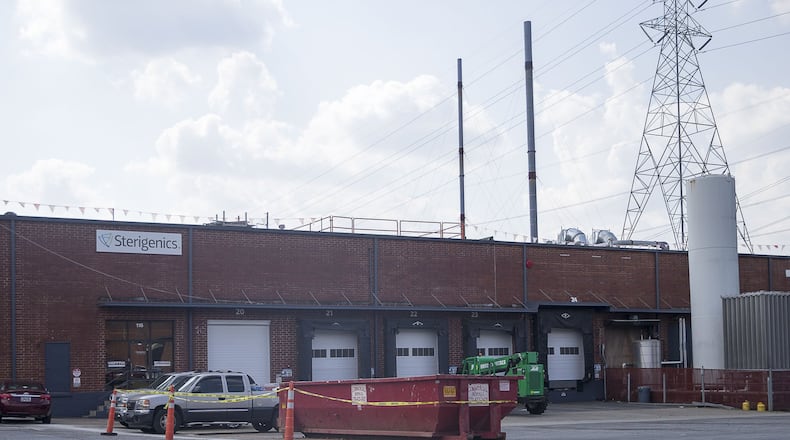Companies that use ethylene oxide as part of their operations will now have to report any spills or releases of the gas to the Georgia Environmental Protection Division.
Gov. Brian Kemp on Wednesday signed into law Senate Bill 426, which requires companies to notify the EPD of spills or releases of any amount to the agency within 24 hours. The EPD is also required to make information about the spills available on its website.
State Rep. Erick Allen, who represents Smyrna, said the law is a “great first step” in making sure communities are safer from gases like ethylene oxide, which has been classified by the U.S. Environmental Protection Agency as a carcinogenic gas. The gas is used by companies like Sterigenics and Becton Dickinson to sterilize medical equipment. Sterigenics did not respond to The Atlanta Journal-Constitution’s request for comment.
Allen praised the work of residents who kept the spotlight on those companies’ use of the gas and the effect it has had on their communities.
“We would not be here today without the members of Stop Sterigenics and the many community leaders who helped me shape similar legislation earlier this year and then pushed hard for this legislation. I am happy to stand with them in the fight for a safer community and look forward to getting more done on this issue next year.”
READ | Georgia EPD doubted ethylene oxide cancer risks. Other states acted.
The use of ethylene oxide came under scrutiny after a July story by WebMD and Georgia Health News reported potential increased cancer risks for residents in neighborhoods surrounding Sterigenics, which is located on Plant Atkinson Road near Smyrna. Becton Dickinson also experienced increased scrutiny of its operations at its plants in Covington and Madison.
Residents attended town hall meetings and protests to call for Sterigenics’ closure, and some cancer survivors wondered if their long-term exposure to ethylene oxide factored into their illnesses.
Stergenics argues on its website that ethylene oxide is a naturally-occurring gas that’s produced by the human body, plants, exhaust from vehicles, agriculture chemicals and gas grills, and it’s needed for the only method of satisfying “FDA-approved sterility validations for many critical medical devices.”
RELATED | Explosion, gas leak raise fresh safety concerns at Sterigenics plant
Amid public outcry and protests, Sterigenics suspended operations last summer to install new pollution controls. Cobb County later kept the plant closed, alleging that it was out of compliance with its fire codes.
To help fight the shortage of medical equipment due to the COVID-19 pandemic, County Chairman Mike Boyce in March signed an emergency declaration to allow the company to resume sterilization activity on a limited basis. Sterigenics then filed a lawsuit against the county on the basis that Cobb didn’t have the authority to keep the plant closed.
A judge issued a temporary restraining order against the county and granted Sterigenics’ request to resume full operations. A consent order signed in April allowed the company to continue its operations indefinitely while its lawsuit filed against the county moves through the court system.
RELATED | For cancer survivors, Sterigenics raises haunting questions
Tony Adams, a Cobb County resident who has been active in protesting Sterigenics’ use of ethylene oxide, said he and other residents opposed to the company’s presence are grateful that Gov. Kemp signed the legislation into law.
“There are other necessary steps that need to be in place to keep our neighborhoods free of carcinogens,” Adams said.
Adams said some companies during the pandemic have began using vaporized hydrogen peroxide, which he said is an alternative he would like to see other companies adopt around the globe.
Janet Rau, president of Stop Sterigenics Georgia, said the company’s presence in the community has affected property values. The Cobb County Board of Tax Assessors recently approved a 10% reduction in residential property valuations within a two-mile radius of the facility, said Chief Appraiser Stephen White.
White told the AJC the Board approved the reduction because it “recognizes that there is an environmental air quality concern surrounding the Sterigenics plant.” White also said the board believes that since the area within the radius has experienced “limited sales and listing activity,” it is difficult to determine the effect Sterigenics’ operations has had on property values. The Board of Tax Assessors will review the area again for the 2021 tax year.
Rau said she and other residents are calling on Sterigenics to relocate its operations to an area not surrounded by homes.
“This is a slow-rolling disaster for our community,” she said.
About the Author
Keep Reading
The Latest
Featured

